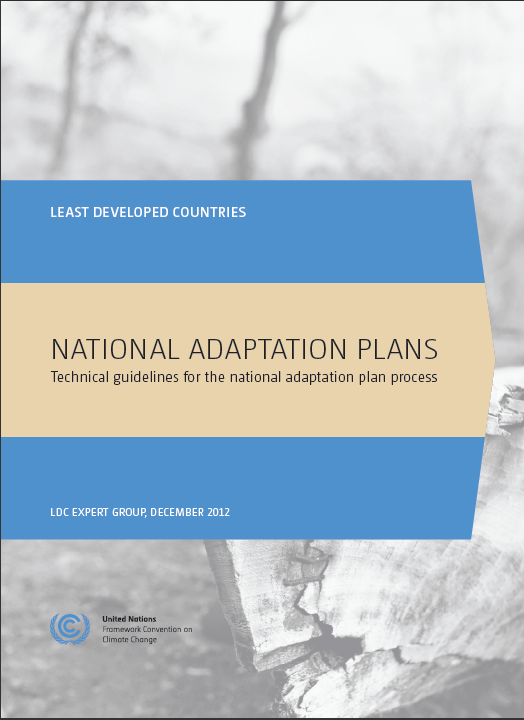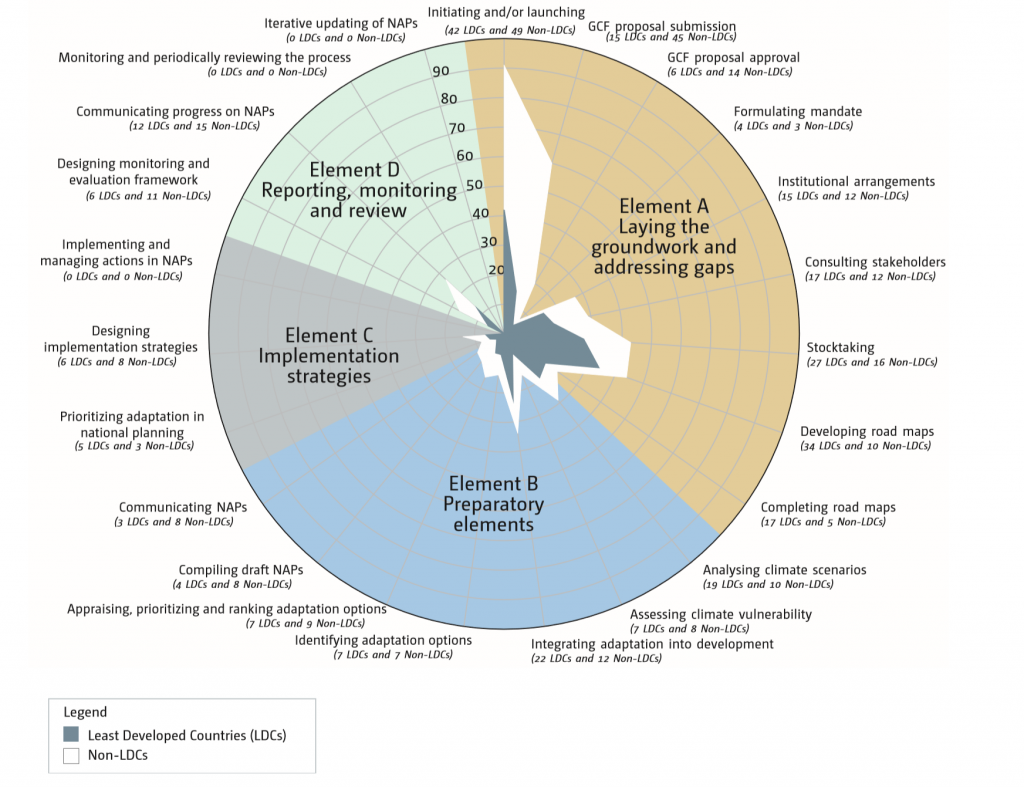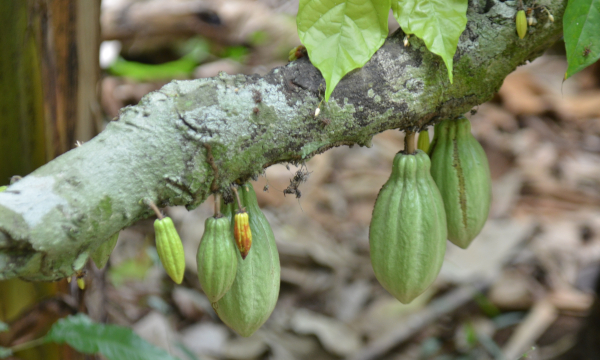In 2010, governments under the United Nations Framework Convention on Climate Change (UNFCCC) established the process to formulate and implement National Adaptation Plans (NAPs). Through this process, developing countries are able to identify their adaptation needs and to develop and implement strategies and programmes in an ongoing manner to address those needs. NAPs are the main output of the process and contain all necessary information about the national process, prioritized adaptation policies, projects and programmes, implementation, monitoring and review, and more.
A strong architecture of technical and financial support has been established under the UNFCCC to support developing countries to formulate and implement their NAPs. Funding for NAPs is provided through the Green Climate Fund (GCF), the Least Developed Countries Fund (LDCF) and the Special Climate Change Fund (SCCF), as well as through a variety of bilateral, multilateral, and other channels. The Least Developed Countries Expert Group (LEG) the Adaptation Committee (AC) and other bodies under the UNFCCC process guide countries on NAPs.

Figure 1: Technical guidelines for the NAP process, developed by the Least Developed Countries Expert Group. They are available in multiple languages at http://unfccc.int/7279. They provide the basis for the formulation and implementation of NAPs.
Countries are actively engaged in advancing NAPs
The first assessment of the progress made thus far was conducted in 2018, and a decision reflecting the status of progress was adopted at the UNFCCC annual climate change conference in December 2018. The results showed that noteworthy progress is being made in different fronts – developing countries are undertaking various activities to advance their work on NAPs and the support for NAPs continues to evolve. Out of the 153 developing countries under the UNFCCC, 11 countries had successfully completed and submitted their NAPs, with a further 80 having initiated the process. The latest submissions of NAPs in 2018 have been from Colombia, Saint Lucia, and Togo.
Much of the progress made is on laying the groundwork
The assessment further revealed that many countries have made more progress on or are actively engaged in putting in place institutional arrangements for leadership and coordination of the process at the national level as well as for engaging with external stakeholders. Several countries have developed statutory laws to fortify the process within their national systems. Much of these were achieved through existing national resources and institutional arrangements.

Figure 2: Status of progress made in the process to formulate and implement NAPs as at December 2018. Source: UNFCCC LDC Expert Group (2018). National adaptation plans 2018: Progress in the process to formulate and implement NAPs. Available at https://unfccc.int/node/185680
Countries are taking steps to access funding from the Green Climate Fund
Many countries with the assistance of various delivery partners have prepared and submitted funding proposals to the GCF to access the funds of up to USD 3 million per country, to add the necessary detail to prepare their plans and to further strengthen their processes. As at 4th December 2018, 22 such proposals amounting to USD 81 million had been approved or endorsed for funding to support the formulation of national adaptation plans and/or other adaptation planning processes amounting. Out of these, 6 proposals, amounting to USD 15 million, were from the LDCs, opening opportunities for those countries to complete the formulation of their first generation of NAPs soon.

Figure 3: Status of proposals submitted for formulation of NAPs under the GCF readiness and preparatory support programme as at October 31 2018 (FCCC/SBI/2018/INF.13)
The LEG as well as the LDCs themselves aspire to see each of the LDCs complete their first NAP by 2020, to ensure that they will be able to address adaptation ambitiously, in a manner consistent with national priorities and the goals set under the UNFCCC.
Countries have taken concrete steps to integrate adaptation into development plans and budgets, such as establishing new committees and technical working groups, adding adaption responsibilities to existing institutions, establishing national trust funds, establishing and enhancing regulatory frameworks, climate-proofing existing policies and projects, and ensuring high-level participation in the decision-making processes.
Vibrant technical support exists to advance NAPs
Technical support is available for developing countries through the UNFCCC constituted bodies, various organizations, support programmes, regional centres and networks. The LEG through the NAP Technical Working Group brings together all actors to work on common methodologies to support countries.
LDCs and other developing countries are accessing GCF NAP Readiness funding for the formulation of NAPs with the support of accredited delivery partners, such as UNDP, UNEP and FAO are assisting countries in accessing these funds. As of 24th October 2018, among the countries taking steps to access GCF NAP Readiness funding, 49 are supported by UNDP, 9 by UNEP, 5 by local delivery partners, and 3 by other entities.
UNFCCC and LEG also provides support and capacity building for NAPs through activities such as NAP expos conducted globally and regionally, trainings, preparation of Open NAPs, and knowledge management through NAP Central.
NAPs are grounded on strong guiding principles
The countries under the UNFCCC recognized that the current process-based approach is a good practise, and that it has profited from the experiences and lessons learned during the prior national adaptation programmes of action. Further, the parties also noted the importance of multi-stakeholder engagement including party and non-party stakeholders, civil society, the private sector, cities, and local communities. The importance of vulnerability and risk assessments was also highlighted, as well as gender as a key aspect of NAP preparation ensuring gender responsive and sensitive NAPs, and gender balanced decision making in adaptation related activities.

Figure 4: The LDC Expert Group has produced a technical paper on strengthening gender considerations in NAPs. It presents the steps to integrate gender in adaptation, and some of the best practices countries could apply.
Despite the progress, gaps and challenges remain
While appreciating the progress that has been made, the assessment also noted some persisting difficulties. The primary one is difficulties in accessing funding by many LDCs to prepare their NAPs and advance the process at their national levels.
Way Forward
As a way forward, the COP requested the LEG and the Adaptation Committee to include the gaps and needs they have identified in their respective reports at COP25 in November 2019, which in turn will be converted into necessary steps for a progress assessment in 2021 by the SBI. All parties are invited to continue providing information on the progress of the NAPs via NAP Central and making progress on their NAPs at the ground-level.
All parties are invited to continue providing information on the progress of the NAPs via NAP Central and making progress on their NAPs at the ground-level.


